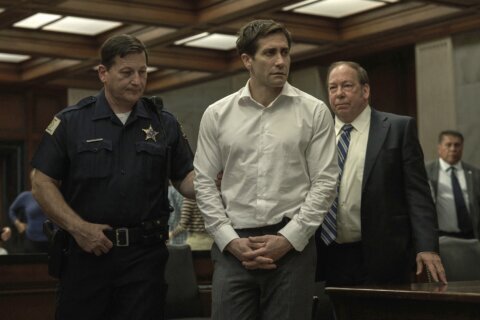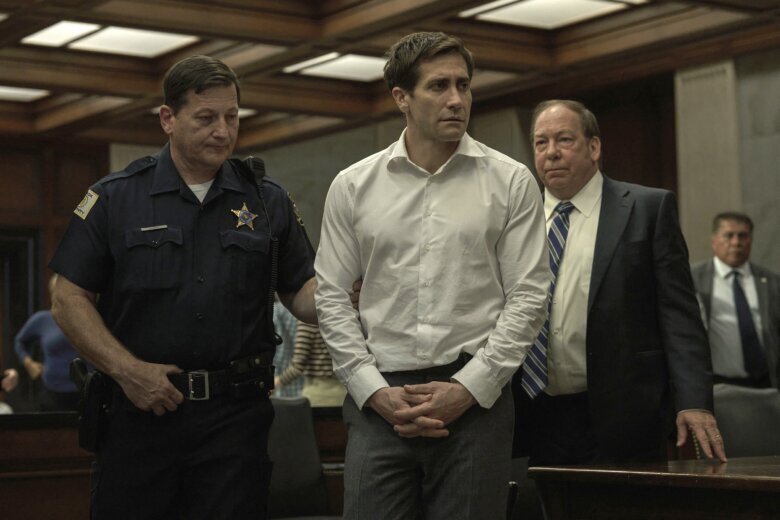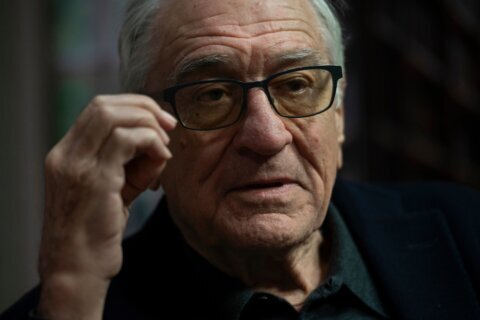In 1990, Harrison Ford had just wrapped his original trilogy as the heroic Indiana Jones when he decided to shift into a more duplicitous character in the twisty legal thriller “Presumed Innocent,” a smash hit directed by the great Alan J. Pakula who bridged Ford’s evolution of tangled husbands from “Frantic” (1988) to “The Fugitive” (1993).

Now, a quarter century later, “Presumed Innocent” is the No. 1 show on Apple TV+, having premiered the first two of its eight episodes back on June 12, keeping us guessing with cliffhangers in weekly installments, and now dropping its thrilling finale this Wednesday, providing fresh plot twists to the classic courtroom drama.
Based on the 1987 novel by Scott Turow, the story follows the slick but shady Chicago prosecutor Rusty Sabich (Jake Gyllenhaal), who becomes the prime suspect in the murder of colleague Carolyn Polhemus (Renate Reinsve), who was also his mistress. Now, he must profess his criminal innocence and atone for his moral betrayal of his wife Barbara (Ruth Negga) and their two teenage kids Jaden (Chase Infiniti) and Kyle (Kingston Rumi Southwick).
It’s a tricky proposition to convince audiences to spend seven straight weeks rooting for such an unlikable, ethically dubious protagonist like Rusty. Even if you think he’s innocent of the crime of murder, his sins against his family are a lot to overcome as the show’s core thematic question walks the line of legal vs. moral corruption.
Beyond that, it’s also a lot to ask audiences (TV’s jurors) to spend seven weeks watching a series where we think we already know where it’s headed. Ultimately, your investment in the series will likely depend on whether or not you’ve seen the 1990 film (which I have), so let’s break down this comparison in three categories in order to render a verdict on whether the series is guilty or not guilty of the cinematic crime of a crude carbon copy:
What the movie did better
It’s hard to top a viewer’s first experience with material. That’s when the memorable characters, compounding conflicts and killer twists were first introduced and thus felt the most original. If you saw the movie back in the ’90s, you’ve seen a lot of this same stuff before and feel like you know roughly where it’s all heading — or do you?
The twist was so shocking that producer Sydney Pollack instantly bought the book rights between legal thrillers of his own like “Absence of Malice” (1981) and “The Firm” (1993). Pakula was the perfect pick to direct “Presumed Innocent,” bringing a similar tone as his masterful paranoia trilogy of “Klute” (1971), “The Parallax View” (1974) and “All the President’s Men” (1976) before his twilight years of legal thrillers like “The Pelican Brief” (1993).
Revisiting the film today wistfully recalls a lost era of moviegoing that I mourn, back when adult legal thrillers regularly became blockbusters. “Presumed Innocent” was water-cooler conversion after nearly cracking the box office Top 10 of 1990, ranking No. 11 domestically at $86.3 million, the equivalent of $207.5 million today, more than “Godzilla x Kong: The New Empire,” “Bad Boys: Ride or Die” and “Kingdom of the Planet of the Apes.”
Where the TV series rivals the movie
If you’re a fan of the movie, you’ll be glad to know that Jake Gyllenhaal easily rivals Harrison Ford as the antihero with the tortured eyes of a guilty conscience. It’s impossible to tell if Jake is tricking us or not because he brings with him both sides of the criminal coin in our cinematic muscle memory, hunting serial killers in “Zodiac” (2007) and “Prisoners” (2013) but pushing the legal limits in “Donnie Darko” (2001) and “Nightcrawler” (2014).
The flashback portrayal of the deceased mistress is also equally strong, if not more developed this time around. While Greta Scacchi (“The Player”) was shown seducing Ford, her sudden dismissal of him feels rushed if you watch the film today. Conversely, Norwegian actress Renate Reinsve (“The Worst Person in the World”) is given more ammunition in the TV series, allowing us to see her gradual discomfort with Rusty’s growing obsession.
The rest of the supporting cast is just as deep, namely Bill Camp, who remains one of the finest character actors working today from “The Night Of” to “The Queen’s Gambit.” He is a worthy fill-in for the late Brian Dennehy as District Attorney Raymond Horgan, who is no longer shady like the film but rather a sympathetic moral compass alongside wife Lorraine (played by Camp’s wife Elizabeth Marvel, celebrating 20 years of marriage this year).
What the TV series does better
Despite my initial skepticism, I was surprised to find areas where the TV series actually surpasses the film.
Showrunner David E. Kelley (who last year celebrated 30 years of marriage to Michelle Pfeiffer) finds new legal maneuvers to ratchet up the courtroom tension like Rusty providing his own defense. Call it contrived, but his closing statement is undeniably powerful, showing Kelley’s roots as a writer on “L.A. Law” before creating legal series like “The Practice,” “Ally McBeal,” “Boston Public,” “Boston Legal,” “Big Little Lies” and “The Lincoln Lawyer.”
Peter Sarsgaard (“Shattered Glass,” “Dopesick”) provides a much more layered performance as the prosecutor Tommy Molto, who was flatly played by Joe Grifasi as an emotionless caricature never cracking a smile in the film. Sarsgaard’s jealous quest to nail Gyllenhaal makes him far more compelling, boosting his closing argument and completing his character arc when he can finally cheer a Chicago Bears game, having moved on from the case.
Most importantly, Ruth Negga (“Loving,” “Passing”) is a major improvement as the heartbroken wife, given multiple scenes of justifiable anger at her husband’s infidelity — even payback by flirting with a bartender. This feels more realistic than Bonnie Bedelia barely batting an eye, standing by her man by telling Ford, “What did you expect?” Plot twists aside, Bedelia’s anger over his cheating should have been shown in the film, not to mention the kids.
The verdict: Not guilty
Your honor, we the jury find the TV series not guilty of the cinematic crime of a crude carbon copy. Sure, it’s apples and oranges to compare an eight-hour miniseries to a two-hour film because it has four times as long to tell its complex story, but there are enough new plot twists to make it an entirely different experience down the stretch.
Whether you’ll enjoy it or not is a matter of taste, all depending on your preconceived notions. If you liked the 1990 film, the 2024 miniseries seems to drag in its middle section, inventing new reasons to stretch out the plot. However, once the culprit is revealed, dare I say it might even reward on repeat viewings, though I highly doubt I’ll rewatch it. Viewers are already being called to jury duty again with critics seated as judges as another case awaits.
Get breaking news and daily headlines delivered to your email inbox by signing up here.
© 2024 WTOP. All Rights Reserved. This website is not intended for users located within the European Economic Area.









